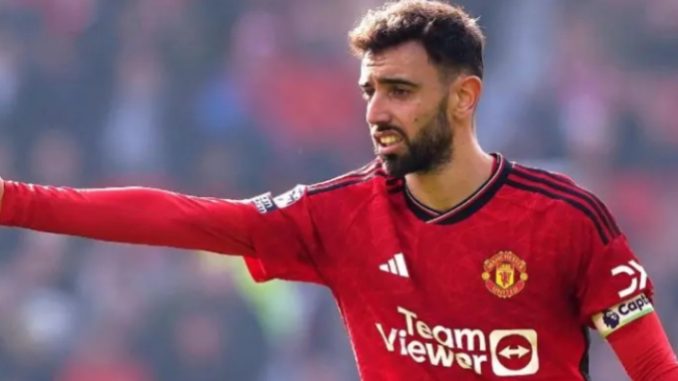
Sport Man United: “Not the Best Thing to Do” – Ruben Amorim Opens Up on Bruno Fernandes’ Attitude Amid Captaincy Concerns
As the Erik ten Hag era at Manchester United seemingly winds down with the incoming appointment of Ruben Amorim, conversations around leadership, discipline, and mentality are gaining momentum at Old Trafford. And at the center of that conversation is none other than club captain Bruno Fernandes.
In a candid and somewhat unexpected comment, new manager-in-waiting Ruben Amorim is reported to have remarked that Bruno Fernandes’ attitude “is not the best thing to do,” referencing the midfielder’s visible frustration on the pitch and interactions with teammates and officials. The statement has sparked debate among fans, analysts, and the footballing community—raising questions about the Portuguese star’s long-term role at the club under new leadership.
Let’s dive deeper into what this means for Manchester United, for Fernandes himself, and for Amorim’s plans to restore structure, accountability, and identity to a fractured team.
—
Bruno Fernandes: Brilliant but Flawed?
There’s no questioning Bruno Fernandes’ impact since joining Manchester United in January 2020. With over 70 goals and 60 assists in all competitions, Fernandes has often been the creative heartbeat of the team. His flair, vision, and work rate earned him the club’s armband in the 2023/24 season after Harry Maguire was demoted from the role.
However, Fernandes’ leadership style has come under increasing scrutiny. While some admire his passion and refusal to accept mediocrity, others—including pundits like Roy Keane and Gary Neville—have criticized his petulant body language, overuse of protest toward referees, and a tendency to show visible frustration when things don’t go his way.
Against top opponents, Fernandes has occasionally drifted out of games or let his emotions get the better of him—raising questions about whether he is the right temperament for captaincy, especially in a dressing room needing clarity and discipline.
—
Amorim’s Leadership Philosophy: Structure and Accountability
Ruben Amorim has cultivated a reputation as a tactically intelligent, emotionally intelligent, and ruthlessly efficient coach at Sporting CP. His system demands total commitment to team ethics, positional discipline, and maturity both on and off the pitch.
In a recent interview, when asked about his views on leadership within a team, Amorim stated:
> “You can be passionate, yes. You must show emotion. But when it becomes a distraction for your teammates, or when it affects your focus on the plan, it’s not the best thing to do.”
Though he didn’t mention Fernandes by name in that quote, insiders suggest it was a thinly veiled critique of the Portuguese playmaker’s on-pitch demeanor.
Amorim believes leadership is about calmness under pressure, clear communication, and relentless team-first mentality—a stark contrast to Fernandes’ more demonstrative and volatile style.
—
The Captaincy Under Review
As Amorim prepares to overhaul Manchester United’s footballing culture, one of his first decisions could be a review of the club’s captaincy. While Fernandes remains a key contributor on the pitch, Amorim may seek to appoint a leader who better reflects his style—someone who leads by example with consistency and emotional control.
Names like Lisandro Martínez, Raphaël Varane (if he stays), and even Kobbie Mainoo have been mentioned as potential future leaders. Martínez, in particular, fits Amorim’s demands for leadership—passionate yet composed, aggressive but focused.
Fernandes’ captaincy isn’t necessarily in jeopardy just yet, but Amorim’s comments suggest that expectations will be raised. If Bruno cannot adapt to this more structured leadership model, a reshuffling of hierarchy within the squad might be on the cards.
—
Dressing Room Dynamics
The Manchester United dressing room has been plagued by inconsistency, cliques, and player discontent over the last several seasons. Previous managers, including Ole Gunnar Solskjær and Ten Hag, struggled to maintain harmony and discipline as results wavered.
Bruno Fernandes, as captain, has often been tasked with rallying the squad, especially through difficult spells. But some insiders claim that his frustrations and overbearing behavior have occasionally rubbed teammates the wrong way, especially younger players who feel his expectations are not always matched by encouragement or support.
Amorim, known for fostering unity and respect, may look to reset the culture. His Sporting side was lauded for its tight-knit, selfless core, and similar values will be demanded at Old Trafford. This means that even star players like Fernandes will need to adapt—or risk being sidelined in favor of more harmonious team dynamics.
—
Tactical Considerations
Beyond leadership, Amorim’s system could also demand a different role for Fernandes. At Sporting, Amorim typically deploys a 3-4-3 formation with fluid rotations in midfield. This system does not naturally accommodate a traditional No. 10, which Fernandes thrives in.
Unless adapted into a deeper role (requiring more positional discipline) or as an inverted wide midfielder, Bruno may struggle to find his ideal place. This could lead to further friction if his tactical freedom is restricted—potentially impacting his form and attitude.
Amorim will be watching closely to see how Fernandes reacts to these changes. If Bruno embraces the tactical evolution and matures into the new system, he could still be a pillar of Amorim’s United. But if resistance persists, he may become one of several high-profile casualties of the Amorim revolution.
—
Fan Reaction: Mixed Signals
The Manchester United fanbase is split. Many adore Fernandes for his work ethic, creativity, and love for the badge. His emotional connection with supporters, especially during the post-pandemic years, was vital.
However, others believe his inability to channel frustration productively has become a liability, particularly when younger players look to him for guidance. Amorim’s comment has reignited that debate, with many fans urging Bruno to evolve his demeanor if he wants to remain an integral figure.
Some have even suggested that Fernandes be allowed to focus solely on his football and be relieved of the armband, allowing him to play with more freedom and less responsibility.
—
Could Fernandes Leave?
It’s unlikely that Fernandes will be sold this summer—he remains one of United’s most important assets. However, Amorim’s arrival brings unpredictability, and if their relationship sours or if Fernandes resists the new manager’s demands, a shock exit cannot be entirely ruled out in 2026 or beyond.
There have been tentative links to clubs in Spain and Italy, and Fernandes’ future may ultimately depend on how flexible and responsive he is to change.
—
Conclusion: Adapt or Step Aside
Ruben Amorim’s comment—that Bruno Fernandes’ attitude is “not the best thing to do”—may sound like a gentle critique on the surface. But beneath it lies a declaration of intent: the new Manchester United will be built on discipline, balance, and a new leadership standard.
For Fernandes, the message is clear. His quality is undeniable, his numbers impressive, and his influence powerful. But in Amorim’s system, passion alone won’t be enough. He must lead with composure, play with structure, and inspire through example, not just emotion.
Whether Bruno Fernandes rises to the challenge or becomes another chapter in United’s turbulent leadership history is now entirely in his hands.
#MUFC | #BrunoFernandes | #RubenAmorim | #CaptaincyDebate | #PremierLeague

Leave a Reply